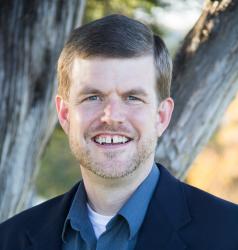In a classic 1976 episode of All in the Family, the TV character Archie Bunker took it upon himself to baptize his grandson at his local church. He did this secretly, as he explained to God, because his son-in-law was a “dopey atheist” who wouldn’t permit the baby to be baptized. You could always count on Archie Bunker to comically reflect the cultural sensibilities and prejudices of his era! One of those sensibilities was that whether you were personally devout or not (Archie reintroduces himself to God since he hasn’t been to church in a while), it was important to raise children in a religious tradition. Archie might not have been able to explain why it was important to do so, but he could have suggested that raising a child in the fold of the church invoked God’s blessings and taught a child right from wrong.
The unquestioned belief that a child should be baptized or otherwise dedicated to God and raised in a faith tradition seems like a relic of an older Christian or Judeo-Christian culture. Signs indicate that today this culture is rapidly passing away in America. A new study by the Survey Center on American Life, affiliated with the American Enterprise Institute, indicates that a majority of “Generation Z” Americans (those with birthdates roughly between the late ’90s and early 2010s) do not believe it is “important for children to be brought up in a religion so they can learn good values.” This compares to the three-quarters of “Silent Generation” Americans (roughly Archie Bunker’s cohort) who believe that children should be brought up in a particular faith.
Before the religiously devout throw up their hands in despair, let’s remember that polling on religion can be extremely difficult to interpret, if not outright misleading. For example, if AEI were able to get me to respond to this poll (response rates these days are typically less than 5%), I might not answer this question affirmatively. Yet my children have attended church the vast majority of Sundays in their lives. As an evangelical Christian, I don’t believe it is important that children be brought up in “a religion,” but in Christianity. (They’re not all the same.) And religious upbringing for me is not primarily about learning “good values” but encountering the grace of the living God. The way you frame questions makes a huge difference. Variant wording can produce wildly different outcomes, even among the small fraction of Americans willing to answer pollsters’ questions. This problem is hardly unique to the AEI poll.
One also imagines there is a nearly infinite range of what Americans could mean by “brought up in a religion.” For some, it could mean maybe attending church on Christmas and Easter. For some sectarian or fundamentalist groups, it could mean your whole social existence is consumed by interaction with other members of your religious community. Moreover, children’s experiences can be vastly different, even within the same congregation and denomination. One family might be wonderfully kind and nurturing in inculcating the faith, and another might be stern and abusive. We can assume that the experience of being “brought up” in a religion deeply impacts what a child thinks about religion as an adult.
In any case, the AEI data surely points to generational differences with regard to raising children in a religious tradition. Archie Bunker’s conviction that a child needed at least minimal introduction to religion is, in other words, becoming much less common. Like many polls in recent years, AEI’s report shows a rise in the “religiously unaffiliated,” or “nones,” which it calculates at 34% of Generation Z but only 9% of the Silent Generation. Strikingly, however, the data suggest that while religious attendance at services and Sunday schools is dropping across generations, the frequency of home-based devotions like prayer and Scripture reading does not appear to be changing much at all. Indeed, there is a slight increase in reading Scripture or other religious texts with the family from the Silent Generation (19%) to Generation Z (21%). This suggests that, while minimal religious commitment may be declining, there may be as many deeply committed religious Americans today as there were in the World War II generation.
Secularization in America seems substantially to mean that many nominally religious Americans of earlier generations have become today’s “nones.” Stories of people growing up in intense religious environments then abandoning their faith as adults have always been tantalizing (one thinks of Ben Franklin’s pilgrimage away from his parents’ Puritan faith in his Autobiography). But there’s no evidence to suggest that this “deconstructing” phenomenon is very common beyond some well-known social media provocateurs. In the AEI poll, a strong majority of all those who grew up in a faith tradition stayed in that tradition as adults or switched to another religious group. Only small minorities grow up religious and then disaffiliate altogether.
Let’s stipulate, though, that it has become more common—even among religious people—for Americans to believe it is not necessary to raise children in a religious tradition. Serious adherents of exclusive monotheistic religions would normally see this attitude as tragic and shortsighted because they see their religion as a unique source of eternal salvation. For those who embrace a relativized, privatized, and pluralistic view of religion, however, there is no reason to “impose” a religion on a child. Let the children sort it out for themselves, they would say. Let them believe or not believe—it’s ultimately up to them. Nothing eternal is at stake anyway.
Americans have undoubtedly become more prone to such thinking since the 1960s, but such beliefs have appealed to a certain segment of Americans for a long time. As I note in my new biography of Thomas Jefferson, Jefferson believed that Revolutionary-era Americans should stop prioritizing religion in schools, particularly in elementary education. He felt that religion should be one of the last subjects an educated person studies, at an age when he or she can make a mature judgment about the topic. Jefferson also believed that religion should be an almost entirely private matter, one not subject to any external authority, whether it be a church, the state, or the scrutiny of more traditional believers. In 1787, Jefferson advised his nephew: “Do not be frightened from [religious] enquiry by any fear of its consequences,” even “if it ends in a belief that there is no god.” For his part, the Unitarian Jefferson concluded that there was indeed one God but no Trinity. He regarded the latter doctrine as an irrational invention of priests and theologians.
Not imposing religion on children may seem sensible, and even virtuous, according to Jeffersonian or elite post-Christian mores. But I will still put in a plug for raising children in your own faith tradition, for several reasons. First, as postmodernists should already know, there is no possibility of religious neutrality. Our views always impose on those we influence; it’s just a question of what views we’re imposing. So if you do not take children to church and do not talk to them about God, you are communicating something important to them about religion. You may be signaling that you are an agnostic or that you regard religion as a matter of private and marginal importance, or that there are many paths to God (including the path of religious passivity). But you’re not being neutral, much less objective, about the issue. You’re imposing on them just as much as the parent who drags them to church every Sunday. And if you do actually believe in eternal life and that God has revealed a way to salvation, it would be cruel not to introduce children (or anyone) to those truths. For believers, it’s as unreasonable as having the cure for cancer but deciding you don’t want to “impose” it on others.
Finally, there is plenty of evidence that religious practice is correlated to healthy outcomes in families. Again, most believers will not engage in religious practices just to become more functional and well adapted, but that is often a happy result of religious adherence. Even with the rising rates of nonaffiliation, religious institutions remain America’s most important source of what scholars call “social capital,” or the community and relational structures that aid human flourishing. Studies have shown a variety of connections between religion and human and familial well-being. For example, low-income women who regularly attend religious services report higher levels of parental satisfaction and less parenting frustration than the nonreligious. This is presumably due to the ways in which congregations offer stage-of-life support, friendship, and encouragement, and the sources of personal strength that believers derive from their faith. Likewise, adolescents who have a strong religious commitment consistently enjoy better relationships with their families and have higher levels of psychological well-being. These seem like particularly important conclusions as our culture faces unprecedented rates of depression and psychological problems among teens.
So it seems that Archie Bunker, for all his failings, had the right inclination about his grandson’s future. It does matter whether our children are raised in a faith tradition, though hopefully practicing that tradition will entail more than a covert baptism! Believers think that knowing God is the most important thing in life, and religious adherence remains an indispensable source of good in families and civil society. Finally, parents really have no choice but to bring their children up with some kind of religious beliefs. Not going to church sends a message to kids just as much as taking them does.

